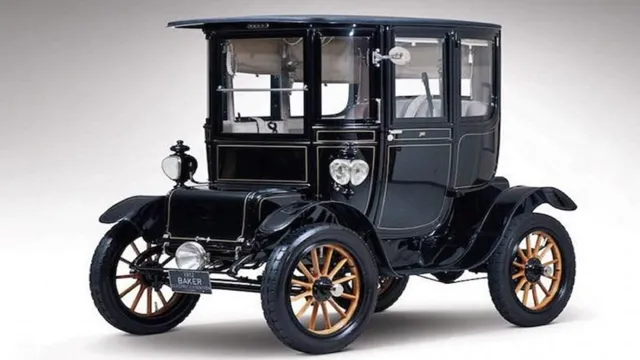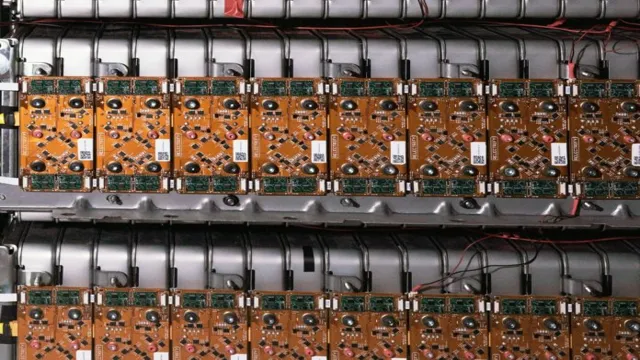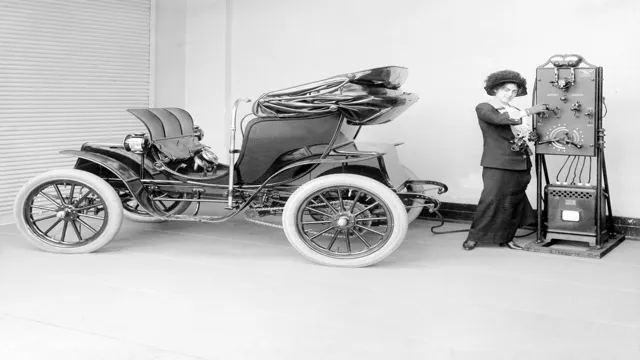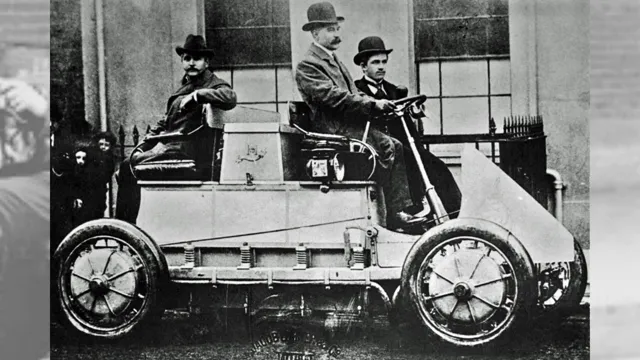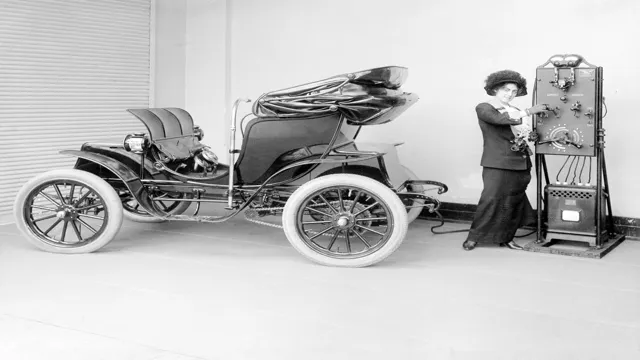The Shocking Comeback: How Electric Cars are Powering the Future in the 21st Century
The electric car revolution is upon us. With sustainable living, carbon footprint reduction and eco-friendliness being the new buzzwords, electric cars are becoming increasingly popular. They promise to change the way we think about transportation and environment.
In this blog, we explore the benefits, challenges, and future of electric cars, and what this transformation means for us as consumers and the global community. The world is now more conscious than ever about the environment and greenhouse gas emissions. Electric cars are emerging as a solution to the ever-growing environmental crisis.
They have zero emissions, unlike traditional gasoline cars, making them an attractive alternative. The transition to electric cars sounds appealing, but it’s not without its challenges. One of the significant obstacles of the electric car revolution is the need for infrastructure development and accessibility.
With charging stations not yet readily available, some people find it hard to venture further than their local grocery store. There’s also the debate on running, maintenance, and charging costs. However, as more companies are investing in electric car technology and consumer demand increases for a more sustainable form of transportation, we’re confident that we’ll find solutions to these challenges.
Going green is indeed exciting, and suitable for everyone would love to participate in making a more sustainable future. In the article following, we’ll dive deeper into the world of electric cars and explore the different aspects that will influence the level of adoption. What’s the future of electric cars? Who are the current market leaders? And with Tesla’s revolutionary autopilot mode and battery technology, is electric car domination inevitable? Keep reading to know more.
Brief History of Electric Cars
The resurgence of electric cars in the 21st century can be traced back to the early 1990s when car manufacturers started experimenting with electric vehicles. However, electric cars were not a new concept. In fact, the first electric car was built in the 1830s and was powered by non-rechargeable batteries.
By the early 1900s, electric cars were a common sight on roads, but the emergence of gasoline-powered cars soon led to their decline in popularity. Fast forward to the 21st century, and the rise of climate change concerns and advancements in battery technology have sparked a renewed interest in electric cars. Today, electric cars are becoming increasingly popular, with major car manufacturers releasing a range of models that offer impressive range and performance.
The main keyword, “resurgence of electric cars,” reflects this new wave of interest in electric vehicles and the growing demand for sustainable transportation options.
Early Innovations
Electric cars have been around for longer than you might think. The first crude electric vehicle was developed in the 1830s, about the same time as the gasoline-fueled car. It wasn’t until the late 1800s when relative advancements made electric cars more practical.
A notable example is Porsche’s first car, the Lohner-Porsche, which was an all-electric vehicle with wheel-mounted electric motors that debuted in 189 However, the high cost and limited driving range of early electric vehicles made them unpopular compared to gasoline-powered cars. Despite this, innovations continued throughout the 20th century, leading to the production of modern electric cars, which offer greater efficiency and a more extended range.
Today, electric vehicles are a good alternative for those seeking a environment-friendly way of transportation and are looking to reduce their dependency on fossil fuels.
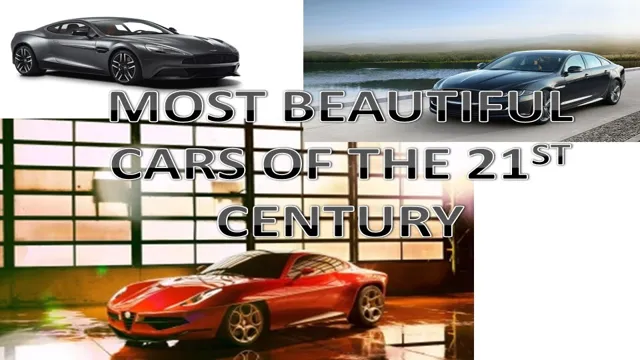
Decline and Resurgence
Electric cars have a long and interesting history. They were first developed in the mid-19th century, but it wasn’t until the early 2000s that they truly began to gain popularity. Early electric cars were slow and had a limited range, but they were cleaner and quieter than their gasoline-powered counterparts.
However, advancements in gasoline engine technology, particularly the invention of the electric starter in 1912, made gasoline cars more convenient to use and more widely accessible. Over the next several decades, electric cars went into decline and were all but forgotten. However, concerns about air pollution and oil dependency in the early 21st century led to a renewed interest in electric cars.
Modern electric cars, such as the Tesla Model S and the Chevrolet Bolt, are clean, efficient, and able to travel hundreds of miles on a single charge, making them practical and attractive options for many drivers. It’s exciting to see how electric cars have advanced over the last century, and it’s clear that they’re here to stay.
Advantages of Electric Cars
The resurgence of electric cars in the 21st century is a testament to their advantages over traditional gas-powered vehicles. One of the biggest advantages of electric cars is their environmental impact, as they produce zero emissions and can significantly reduce our carbon footprint. In addition, electric cars are much cheaper to operate than traditional cars, as they require minimal maintenance and charging.
Furthermore, electric cars have a much smoother and quieter ride, with instant torque and acceleration that surpasses that of gas-powered vehicles. Overall, the resurgence of electric cars is a positive development for the future of transportation and the environment, and their many advantages make them a worthwhile investment for any driver.
Reduced Emissions
Reduced Emissions Electric cars offer many advantages, and reduced emissions are at the top of the list. Unlike conventional cars that run on gasoline, electric cars run on electricity, which produces zero emissions. This means that when you drive an electric car, you don’t pollute the air, contributing to the fight against climate change.
Furthermore, electric cars are much quieter than gasoline cars, which means they also contribute to a quieter environment. The absence of exhaust fumes allows pedestrians and cyclists to breathe cleaner air, which promotes good health. In addition, electric cars have fewer parts than conventional cars, which makes them simpler to build and maintain.
This reduces their carbon footprint even further. Ultimately, electric cars provide a sustainable, environmentally friendly option for transportation that benefits the planet and all its inhabitants. With the increasing emphasis on reducing emissions and combatting climate change, it’s clear that electric cars are the future of transportation.
Lower Cost of Maintenance
Electric cars have become increasingly popular due to their lower cost of maintenance when compared to traditional gasoline-powered vehicles. Since electric cars have fewer moving parts, there is less wear and tear on the vehicle, resulting in fewer repairs needed. Additionally, electric cars don’t require oil changes or spark plug replacements, which can save owners a significant amount of money over time.
Battery replacements (which can occur after several years of use) are typically the most costly maintenance expense; however, as technology improves, battery prices continue to decrease. Overall, lower maintenance costs have made electric cars even more appealing to those looking to save on expenses while being environmentally conscious.
Potential for Renewable Energy
As the world searches for sustainable, environmentally friendly energy sources, electric cars present a promising solution for reducing carbon emissions and reliance on fossil fuels. Not only are they more efficient than traditional gas-powered vehicles, but they also offer significant advantages when paired with renewable sources like wind and solar energy. Electric cars can easily be powered by rechargeable batteries that can be charged using electricity generated from renewable sources, eliminating the need for non-renewable resources.
Plus, with advancements in technology and increased investment from both public and private sectors, electric cars are rapidly becoming more affordable and accessible to the average consumer. By switching to electric vehicles powered by renewable energy, we can reduce pollution, save money on fuel costs, and pave the way for a more sustainable future.
Challenges to Electric Car Adoption
The resurgence of electric cars in the 21st century is definitely a sign of progress in the fight against climate change. However, there are still challenges to overcome before electric cars become the norm. Firstly, the high price points of electric cars remain a barrier to many would-be buyers.
Although prices are expected to drop as technology improves, it may take some time before they become affordable for the average consumer. Secondly, the limited range of electric vehicles is a concern for those who need to travel long distances regularly. While charging infrastructure is improving, it still lags behind in many areas, which means electric car owners may find it difficult to find charging stations on long road trips.
Lastly, there are still concerns around the environmental impact of battery manufacturing and disposal. Overall, while there are challenges to overcome, the benefits of switching to electric cars far outweigh the challenges.
Cost and Infrastructure
The cost and infrastructure of electric cars remain a significant challenge to widespread adoption. The high upfront cost of purchasing an electric vehicle continues to deter many consumers from making the switch, despite the long-term cost savings of reduced fuel and maintenance expenses. Additionally, the infrastructure for charging electric cars is not yet as widely available and convenient as gas stations.
This lack of charging options makes it difficult for drivers to take long trips without worrying about running out of charge. However, strides are being made to address these challenges, with government incentives for purchasing electric vehicles and private companies investing in the development of more charging stations. As the cost of electric cars continues to decrease and the infrastructure for charging them becomes more widely available, we can expect to see more and more drivers making the switch to this cleaner, more sustainable mode of transportation.
Range and Charging Time
Electric Car Adoption As we shift towards a more sustainable future, electric cars are becoming an increasingly popular choice for many drivers. However, challenges to electric car adoption still exist, particularly when it comes to range and charging time. Many drivers are hesitant to make the switch to electric cars because they fear getting stranded on the road due to limited range and lengthy charging times.
To address these concerns, manufacturers are continually improving battery technology to increase range and reduce charging times. In addition, charging infrastructure is rapidly expanding, making it easier and more convenient for drivers to charge their cars on the go. Despite these improvements, there is still work to do to make electric cars a viable option for more drivers.
Another challenge to electric car adoption is the higher cost compared to traditional gas-powered cars. However, as technology continues to improve and economies of scale are achieved, the cost of electric cars is gradually decreasing. In addition, incentives and tax credits are often available to make electric cars more affordable for consumers.
Overall, the shift towards electric cars is an exciting development for the future of transportation. While challenges exist, progress is being made to overcome them and make electric cars a more appealing and practical option for drivers.
Future Outlook for Electric Cars
The resurgence of electric cars in the 21st century is no coincidence but a result of the growing concern for the environment and depletion of fossil fuels. While early electric cars faced several challenges such as limited range, high cost and lack of infrastructure, new technology and innovation has seen electric vehicles become more practical and affordable. With the introduction of longer-lasting batteries, faster charging and more efficient engines, it is predicted that electric cars will become increasingly popular in the coming years.
Governments and car manufacturers are investing heavily in electric technology, with some countries even announcing plans to ban the sale of petrol and diesel cars in the near future. As electric cars continue to evolve, their environmental benefits, low operating costs and quiet ride are sure to win over even the most skeptical drivers.
Conclusion
The resurgence of electric cars in the 21st century has sparked a revolution in the automotive industry, giving rise to a new era of sustainable transportation. With cutting-edge technology, innovative design, and an increased focus on environmental consciousness, electric cars are becoming more accessible and efficient than ever before. They offer a glimpse into a future where driving is no longer a burden on the planet, but a means of preserving it.
So let’s embrace this new era of driving, one that’s electrifying in every sense of the word!”
FAQs
What factors have contributed to the resurgence of electric cars in the 21st century?
The main factors behind the resurgence of electric cars include advances in battery technology, government incentives and policies promoting clean energy, and increased public awareness and concern about environmental issues.
What are some of the benefits of electric cars compared to conventional gasoline-powered vehicles?
Electric cars offer a number of advantages over conventional cars, including lower fuel and maintenance costs, reduced emissions, and quieter and smoother operation. They also provide greater energy efficiency, as electric motors convert up to 90% of the energy stored in batteries into motion, while gasoline engines are typically only about 20% efficient.
How long do electric car batteries typically last, and what happens to them when they reach the end of their useful life?
The lifespan of electric car batteries varies depending on factors such as usage patterns and environmental conditions, but most modern electric cars are designed to last between 100,000 and 200,000 miles before needing battery replacement. At the end of their useful life, electric car batteries can be recycled or reused for other applications such as stationary energy storage.
What challenges does the electric car industry face in the coming years, and how can they be overcome?
The electric car industry still faces several challenges, including high production costs, limited driving range, and a lack of charging infrastructure. However, these challenges are being addressed through innovations in battery technology, increased investment in charging infrastructure, and government policies aimed at promoting electric vehicle adoption. With these efforts, the electric car industry is poised for continued growth and progress in the years ahead.
